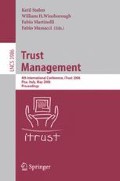Abstract
Many reputation systems mainly concentrate on avoiding untrustworthy agents by communicating reputation. Here arises the problem that when an agent does not know another agent very much then there is no way to notice such ambiguity. This paper shows a new protocol in which an agent can notice that ambiguity using the notion of statistics, and illustrates the facility of designing agents’ algorithms as well as existing reputation systems.
Access this chapter
Tax calculation will be finalised at checkout
Purchases are for personal use only
Preview
Unable to display preview. Download preview PDF.
References
Awerbuch, B., Azar, Y., Lotker, Z., Patt-Shamir, B., Tuttle, M.R.: Collaborate With Strangers To Find Own Preferences. In: Proc. 17th Annual Symposium on Parallelism on Algorithms and Architectures (SPAA 2004) (2004)
Awerbuch, B., Kleinberg, R.D.: Competitive Collaborative Learning. In: Auer, P., Meir, R. (eds.) COLT 2005. LNCS (LNAI), vol. 3559, pp. 233–248. Springer, Heidelberg (2005)
Awerbuch, B., Patt-Shamir, B., Peleg, D., Tuttle, M.: Improved Recommendation Systems. In: Proc. ACM-SIAM Symposium on Discrete Algorithms (SODA) (2005)
Awerbuch, B., Patt-Shamir, B., Peleg, D., Tuttle, M.: Collaboration of Untrusting Peers with Changing Interests. In: Proc. 5th ACM Conference on Electric Commerce (EC) (2004)
Blaze, M., Feigenbaum, J., Lacy, J.: Decentralized Trust Management. In: Proc. 1996 IEEE Symposium on Security and Privacy, pp. 164–173 (1996)
Blaze, M., Feigenbaum, J., Keromytis, A.D.: KeyNote: Trust management for public-key infrastructure. In: Christianson, B., Crispo, B., Harbison, W.S., Roe, M. (eds.) Security Protocols 1998. LNCS, vol. 1550, pp. 59–63. Springer, Heidelberg (1999)
Douceur, J.R.: The Sybil Attack. In: Druschel, P., Kaashoek, M.F., Rowstron, A. (eds.) IPTPS 2002. LNCS, vol. 2429, pp. 251–260. Springer, Heidelberg (2002)
Drineas, P., Kerenidis, I., Raghavan, P.: Competitive Recommendation Systems. In: Proc. Annual ACM Symposium on Theory of Computing (2002)
Kumar, R., Raghavan, P., Rajagopalan, S., Tomkins, A.: Recommendation Systems: A Probabilistic Analysis. In: Proc. 39th Annual Symposium on Foundations of Computer Science (FOCS), pp. 664–681 (1998)
Kleinburg, J., Sandler, M.: Using Mixture Models for Collaborative Filtering. In: Proc. Thirty-sixth Annual ACM Symposium on Theory of Computing (STOC) (2004)
Kamvar, S.D., Schlosser, M.T., Garcia-Molina, H.: The EigenTrust Algorithm for Reputation Management in P2P Networks. In: Proc. Twelfth International World Wide Web Conference (WWW 2003), pp. 640–651 (2003)
Liu, J., Issarny, V.: Enhanced Reputation Mechanism for Mobile Ad Hoc Networks. In: Jensen, C., Poslad, S., Dimitrakos, T. (eds.) iTrust 2004. LNCS, vol. 2995, pp. 48–62. Springer, Heidelberg (2004)
Mui, L., Mohtashemi, M., Halberstadt, A.: A Computational Model of Trust and Reputation. In: Proc. 35th Annual Hawaii International Conference on System Science (HICSS 2002) (2002)
Moreton, T., Twigg, A.: Enforcing Collaboration in Peer-to-Peer Routing Services. In: Nixon, P., Terzis, S. (eds.) iTrust 2003. LNCS, vol. 2692, pp. 255–270. Springer, Heidelberg (2003)
Page, L., Brin, S., Motwani, R., Winograd, T.: The PageRank Citation Ranking: Bringing Order to the Web. Technical report, Stanford Digital Library Technologies Project (1998)
Patel, J., Teacy, W.T.L., Jennings, N.R., Luck, M.: A Probabilistic Trust Model for Handling Inaccurate Reputation Sources. In: Herrmann, P., Issarny, V., Shiu, S.C.K. (eds.) iTrust 2005. LNCS, vol. 3477, pp. 193–209. Springer, Heidelberg (2005)
Whitby, A., Jøsang, A., Indulska, J.: Filtering Out Unfair Ratings in Bayesian Reputation Systems. In: Proc. Workshop on Trust in Agent Societies (AAMAS 2004) (2004)
Author information
Authors and Affiliations
Editor information
Editors and Affiliations
Rights and permissions
Copyright information
© 2006 Springer-Verlag Berlin Heidelberg
About this paper
Cite this paper
Yonezawa, K. (2006). A Novel Protocol for Communicating Reputation in P2P Networks. In: Stølen, K., Winsborough, W.H., Martinelli, F., Massacci, F. (eds) Trust Management. iTrust 2006. Lecture Notes in Computer Science, vol 3986. Springer, Berlin, Heidelberg. https://doi.org/10.1007/11755593_30
Download citation
DOI: https://doi.org/10.1007/11755593_30
Publisher Name: Springer, Berlin, Heidelberg
Print ISBN: 978-3-540-34295-3
Online ISBN: 978-3-540-34297-7
eBook Packages: Computer ScienceComputer Science (R0)

